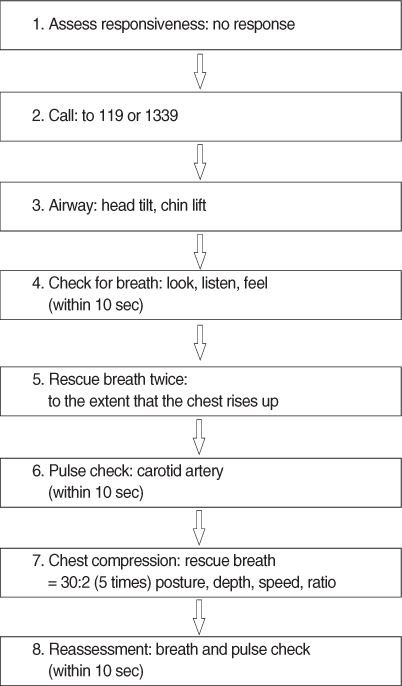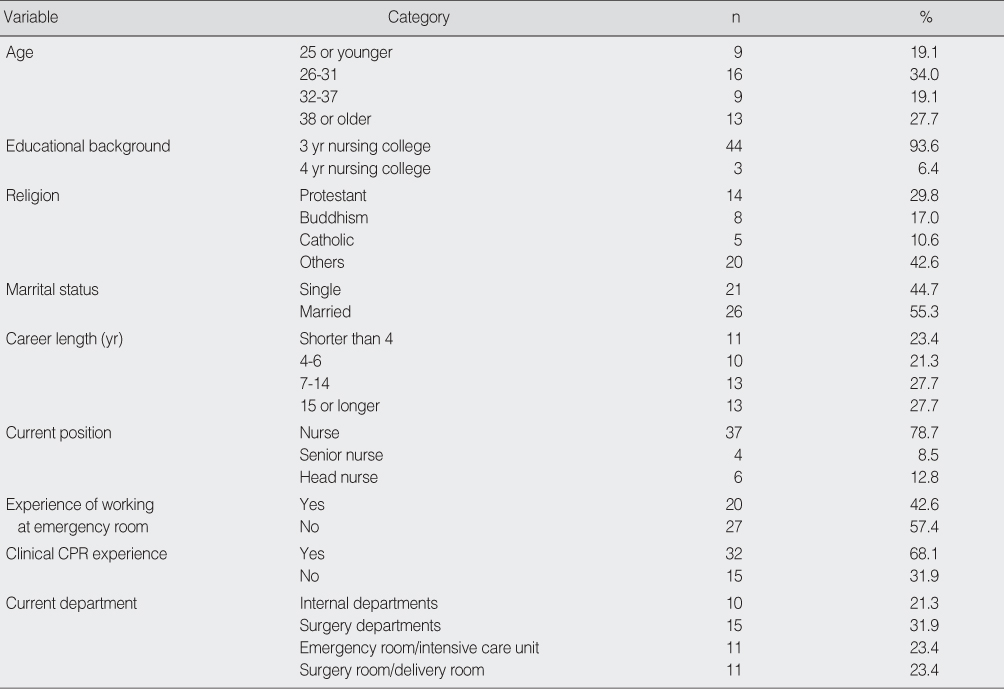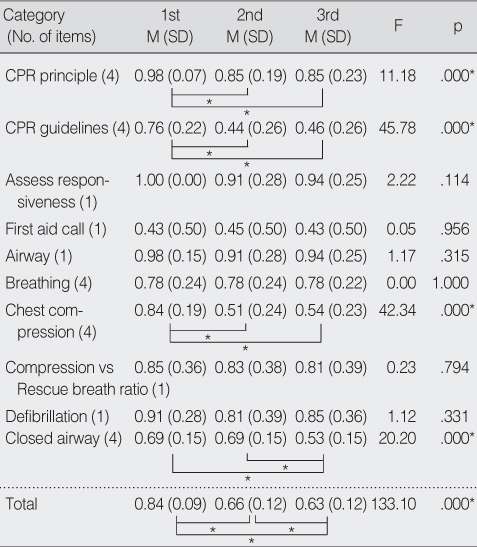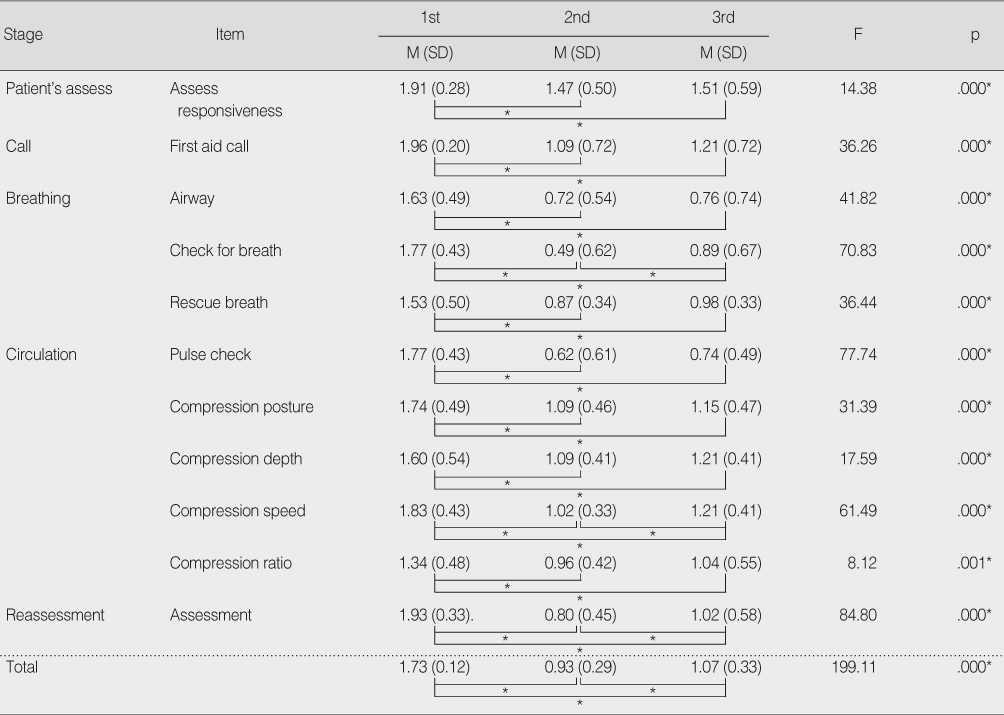Articles
- Page Path
- HOME > J Korean Acad Nurs > Volume 38(3); 2008 > Article
-
Original Article
- A Study on the Sustainable Effects of Reeducation on Cardiopulmonary Resuscitation on Nurses' Knowledge and Skills
- Soo-IL Oh, Sang-Sook Han
-
Journal of Korean Academy of Nursing 2008;38(3):383-392.
DOI: https://doi.org/10.4040/jkan.2008.38.3.383
Published online: June 30, 2008
1Nursing Director, Gyeonggi Provincial Medical Center Pocheon Hospital, Pocheon, Korea.
2Professor, College of Nursing Science/East-West Nursing Research Institute, KyungHee University, Seoul, Korea.
- Address reprint requests to: Oh, Soo-IL. Gyeonggi Provincial Medical Center Pocheon Hospital, 243-4 Shinup-dong, Pocheon 487-804, Korea. Tel: 82-31-539-9465, Fax: 82-31-539-9137, odri40@hanmail.net
• Received: November 25, 2007 • Accepted: April 12, 2008
Copyright © 2008 Korean Society of Nursing Science
Abstract
-
Purpose
- This study was to analyze the sustainable effects of cardiopulmonary resuscitation (CPR) reeducation on nurses' knowledge and skills.
-
Methods
- A repeated experimental design was used for a single sample group of 47 nurses working for a general hospital. The nurses were tested on their skill of CPR 3 times at an interval of 4 months. In order to test nurses' knowledge and skills, the researcher used a CPR assessment program linked to an adult practice doll (Anne).
-
Results
- 1) The amount of decrease of nurses' knowledge about CPR between points of time was wide between the first and second points of time but small between the second and third time owing to the effects of reeducation between the two points of time. 2) Nurses' skills between the first and second time dropped but they improved between the second and third time owing to the effects of reeducation.
-
Conclusion
- As confirmed by the above findings, reeducation of CPR clearly affects nurses' knowledge and skills. Given the fact that the same period of time (4 months) elapsed between the 3 tests, it could be argued that the reeducation at the second test served to maintain nurses' knowledge and enhance their skills.
- 1. Abella BS, Alvarado JP, Myklebust H, Edelson DP, Barry A, O'Hearn N, et al. Quality of cardiopulmonary resuscitation during in-hospital cardiac arrest. The Journal of the American Medical Association. 2005;293:305–310.ArticlePubMed
- 2. Badger T, Rawstorne D. An evaluative study of pre-registration nursing students' skills in basic life support. Nurse Education Today. 1998;18:231–236.ArticlePubMed
- 3. Baek ML. Analysis on the efficacy of CPR training for first responders. The Journal of the Korean Society of Emergency Medical Technology. 2000;4(4):83–93.
- 4. Baek ML, Lee IS. A study on sustainability of CPR education effects for policemen. The Journal of the Korean Society of Emergency Medical Technology. 2001;5(5):63–71.
- 5. Choi HJ. A study of the knowledge and attitude of first responder about cardiopulmony resuscitation. 2006;Seoul, Hanyang University. Unpublished master's thesis.
- 6. Choi HO. A study on knowledge and competence of nurses in performing cardiopulmonary resuscitation. 2005;Seoul, Yonsei University. Unpublished master's thesis.
- 7. Goodwin AP. Cardiopulmonary resuscitation training revisited. Journal of Royal Society of Medicine. 1992;85:452–453.ArticlePDF
- 8. Han JS, Ko IS, Kang KS, Song IJ, Moon SM, Kim SH. The Effectiveness of Cardiopulmonary resuscitation training targeted for nursing students. Journal of Korean Academy of Fundamental Nursing. 1999;6:492–505.
- 9. Hwang SH, Lim KS. CPR and Professional Cardiac First Aid. 2001;Seoul, Gunja.
- 10. Kang KH. The effectiveness of a cardiopulmonary resuscitation program for first responders in Korea. 1998;Seoul, Ewha Womans University. Unpublished master's thesis.
- 11. Kang KH. A study on field emergency care personnels' CPR knowledge and skills. Journal of Gachon Gil University. 2001;29:381–389.
- 12. Statistical yearbook about causes of death. Korea National Statistical Office. 2006;Retrieved July 25, 2006. from http://www.nso.go.kr.
- 13. Lauder GR, Mcquillan PJ, Sear JW. Basic life support training. Anaesthesia. 1992;47:1000–1001.ArticlePubMed
- 14. Lee IS, Baek ML. The effectiveness of cardiopulmonary resuscitation training targeted for policemen. The Journal of the Korean Society of Emergency Medical Technology. 2001;5(5):53–61.
- 15. Lee JE, Ko BY. The evaluation of first responder cardiopulmonary resuscitation training targeted for school nurses. Bulletin of Dongnam College. 2001;19:269–278.
- 16. Lee MH. The effect of CPR training on the knowledge and attitude of laypersons. 2005;Gwangju, Chonnam National University. Unpublished master's thesis.
- 17. Lee SH, Choi OK, Jeong GY. Quantity & quality of prehospital emergency care. Journal of the Korean Society of Emergency Medicine. 1996;7:69–74.
- 18. Oh YH. The effects of CPR training for non-healthcare providers. 2005;Ulsan, Ulsan University. Unpublished master's thesis.
- 19. Park CW, Ok TG, Jo JH, Cheon SH, Lee SY, Kim SE, et al. A study of the effectiveness of CPR training to the personnels of nursing department in the hospital. Journal of the Korean Society of Emergency Medicine. 2005;16:474–480.
- 20. Park JW, Sung CM, Jo YS, Choi YH, Park IC, Kim SH. The retraining effect and retention of CPR skill in medical students. Journal of the Korean Society of Emergency Medicine. 2006;17:8–13.
- 21. Park SH. The knowledge and attitude about basic life support of the spouses of heart disease patients. 2002;Seoul, Ewha Womans University. Unpublished master's thesis.
- 22. Park SH, Choi HJ, Kang BS, Lim TH, Yeom SR. A study assessing the knowledge and attitude of first responders about cardiopulmonary resuscitation. Journal of the Korean Society of Emergency Medicine. 2006;17:545–558.
- 23. Park SK. Development of a CPR courseware for nursing education. 1997;Seoul, Yonsei University. Unpublished master's thesis.
- 24. Park YS, Kim YM, Lee WJ, Kim HJ, Kim YB, Jeong WJ, et al. How knowledge-only reinforcement can impact time-related changes in basic life support (BLS) skills of medical students on clinical clerkship. Journal of the Korean Society of Emergency Medicine. 2006;17:45–50.
- 25. Ramirez AG, Weaver FJ. The efficacy of lay CPR instruction: An evaluation. American Journal of Public Health. 1977;67:1073–1095.
- 26. Smith S, Hatchett R. Perceived competence in cardiopulmonary resuscitation, knowledge and skills, amongst 50 qualified nurses. Intensive & Critical Care Nusing. 1992;8(2):76–81.Article
REFERENCES
Figure & Data
REFERENCES
Citations
Citations to this article as recorded by 

- CAN WE TEACH THE BASIC LIFE SUPPORT TO HEALTH SCIENCES STUDENTS?
Nursemin ÜNAL, Dercan GENÇBAŞ, Gamze ALINCAK
Karya Journal of Health Science.2023; 4(1): 65. CrossRef - Investigating Emergency Department Nurses’ Educational Needs and Exploring Strategies to Meet Challenges Against Management of These Needs: A Qualitative Study
Farnoush Azizi, Behnam Honarvar, Zahra Molazem, Azar Kazemi, Banafsheh Tehranineshat
Shiraz E-Medical Journal.2023;[Epub] CrossRef - Factors Affecting Cardiopulmonary Resuscitation Practice Among Nurses in Mizan Tepi University Teaching Hospital, Tepi General Hospital, and Gebretsadik Shawo Hospital, Southwest Ethiopia
Mirresa Guteta
Open Access Emergency Medicine.2022; Volume 14: 165. CrossRef - Comparison of Long-Term Effects between Chest Compression-Only CPR Training and Conventional CPR Training on CPR Skills among Police Officers
Byung-Jun Cho, Seon-Rye Kim
Healthcare.2021; 9(1): 34. CrossRef - Effects of a Simulation-Based CPR Training Program on Knowledge, Performance, and Stress in Clinical Nurses
Sohyune R. Sok, Jung A. Kim, Yoonshin Lee, Youngmi Cho
The Journal of Continuing Education in Nursing.2020; 51(5): 225. CrossRef - Factors Influencing for Intention to Perform Cardiopulmonary Resuscitation in Elementary and Secondary School Teachers
Kyoung Sun Song, Kyung-Yeon Park
Journal of Korean Academy of Community Health Nursing.2020; 31(3): 384. CrossRef - Current state of knowledge of basic life support in health professionals of the largest city in Pakistan: a cross-sectional study
Babar Irfan, Ibrahim Zahid, Muhammad Sharjeel Khan, Omar Abdul Aziz Khan, Shayan Zaidi, Safia Awan, Sobia Bilal, Omar Irfan
BMC Health Services Research.2019;[Epub] CrossRef - Predicting Factors on Performance Confidence of Cardiopulmonary Resuscitation in Community Members
Su-Jin Lee
Journal of Digital Contents Society.2018; 19(9): 1699. CrossRef - Retention Effect of Basic Life Support Education Program on Attitude, Knowledge, Skillfulness for Nursing Students
Myeong Sook Ahn, Hyun Sook Jo, Dong Choon Uhm, Hyun Hee Ji
Journal of Korean Academic Society of Nursing Education.2017; 23(4): 441. CrossRef - Impact of basic life-support training on the attitudes of health-care workers toward cardiopulmonary resuscitation and defibrillation
Mostafa A. Abolfotouh, Manal A. Alnasser, Alamin N. Berhanu, Deema A. Al-Turaif, Abdulrhman I. Alfayez
BMC Health Services Research.2017;[Epub] CrossRef - Knowledge and performance of cardiopulmonary resuscitation (CPR) in dental hygiene students
Seung-Hun Lee
Journal of Korean society of Dental Hygiene.2016; 16(4): 601. CrossRef - Study of military CPR quality and education by feedback device and debriefing
Soo-Jae Moon, Seon-Rye Kim, Byung-Jun Cho
Journal of the Korea Society of Computer and Information.2016; 21(9): 107. CrossRef - Structural Equation Model of Clinical Nurses' Willingness to Perform Basic Life Support (BLS) in South Korea
Dong-Choon Uhm, Ji-Young Hwang, Myung-he Jun, Dong-ok Kim
Journal of the Korea Academia-Industrial cooperation Society.2016; 17(2): 290. CrossRef - The Effects and Continuum of CPR Education Program on CPR Knowledge, Attitude and Performance in Seafarers
Jae-Ho KIM
Journal of Fisheries and Marine Sciences Education.2016; 28(5): 1301. CrossRef - The effect of teaching cardiopulmonary resuscitation using a song
Won-Joo Lee, Chang-Seop Lee
The Korean Journal of Emergency Medical Services.2016; 20(1): 31. CrossRef - A Study on Continuity of Knowledge, Attitude, and Preventive Behavior among Elementary School Students after Tuberculosis Prevention Education
Gyeong Mi Kim, Heejin Kim, Chung Mo Nam, Sun Ha Jee
Journal of the Korean Society of School Health.2016; 29(3): 209. CrossRef - Relationship between Non-technical Skills and Resuscitation Performance of Nurses' Team in in-situ Simulated Cardiac Arrest
Eun Jung Kim, Kyeong Ryong Lee
Korean Journal of Adult Nursing.2015; 27(2): 146. CrossRef - The Effects of Convergence-Based Reeducation on Core Basic Nursing Skills on Nursing Students' Competence and Confidence
Myung-Sook Jung, Young-Sook Kwon
Journal of Digital Convergence.2015; 13(4): 295. CrossRef - The Effects of Video Programs of Cardiopulmonary Cerebral Resuscitation Education
Gyu Ri Byun, Jeong Eun Park, Hae Sook Hong
Journal of Korean Biological Nursing Science.2015; 17(1): 19. CrossRef - Effects of cardiopulmonary resuscitation reeducation on persistence of knowledge, performance and self-efficacy of nursing students
Myeong-Jeong Chae, Jin-Hee Lee, In-Ja Song, Jin-Il Kim
The Korean Journal of Emergency Medical Services.2015; 19(1): 51. CrossRef - Analysis of attitude and influencing factors toward basic life support in the dental hygienists
Kyung-Yi Jeong, Min-Jung Cho
Journal of Korean society of Dental Hygiene.2015; 15(5): 873. CrossRef - Basic Life Support: A Questionnaire Survey to Assess Proficiency of Radiologists and Radiology Residents in Managing Adult Life Support in Cardiopulmonary Arrest and Acute Anaphylactic Reaction
Tariq Alam, Yasir Jamil Khattak, Muhammad Anwar, Asif Alam Khan
Emergency Medicine International.2014; 2014: 1. CrossRef - Knowledge and attitude toward cardiopulmonary resuscitation in dental hygienists
Kyung-Yi Jeong, Myung-Ok Ha
Journal of Korean society of Dental Hygiene.2014; 14(5): 703. CrossRef - The Implication and Persistence Effect of CPR Education on Female Nursing Students' Knowledge, Attitude, Confidence and Skills in Performing CPR
Geum-Sook Jung, Hyun-Mi Oh, Goya Choi
Journal of the Korea Academia-Industrial cooperation Society.2013; 14(8): 3941. CrossRef - Effects of Basic Life Support Education Program in Middle School Students' Basic Cardiac Life Support Knowledge, Attitude and Performance
Ji-Min Lee, Kyung-Shin Paek
Journal of the Korea Academia-Industrial cooperation Society.2013; 14(10): 4927. CrossRef - The effects of simulation-based resuscitation training on nurses' self-efficacy and satisfaction
Young Sook Roh, Woo Sook Lee, Hyun Soo Chung, Young Mi Park
Nurse Education Today.2013; 33(2): 123. CrossRef - Knowledge, Self-confidence, and Intention of BLS of Clinical Nurses Who Work at Small-medium Sized Hospitals
Dongchoon Uhm, Myunghee Jun, Young Im Park
The Journal of Korean Academic Society of Nursing Education.2012; 18(3): 446. CrossRef - Development and Evaluation of a Patient Safety-focused Inservice Education Program for Surgical Nurse
Young Mee Kim, Myung Sook You, Yaun Hee Cho, Seung Hae Park, Seung Nam Nam, Mi Ok Park, Se Young Kim, Min Young Kim
Journal of Korean Academy of Nursing Administration.2010; 16(2): 152. CrossRef - A Study on the Effectiveness of CPR Training for Nurses in the 6-Sigma Course
Suk-Hee Oh, Keum-Seong Jang
Journal of Korean Academy of Nursing Administration.2010; 16(1): 5. CrossRef
A Study on the Sustainable Effects of Reeducation on Cardiopulmonary Resuscitation on Nurses' Knowledge and Skills



Figure 1
Research design.
Figure 2
CPR action processes.
Figure 3
Diagram of education
and data collection.
Figure 1
Figure 2
Figure 3
A Study on the Sustainable Effects of Reeducation on Cardiopulmonary Resuscitation on Nurses' Knowledge and Skills
Demographic Variables of Subjects (N=47)
CPR=cardiopulmonary resuscitation.
CPR Knowledge Level of Subjects over time (N=47)
*p<.001. CPR=cardiopulmonary resuscitation.
CPR Skills over time (N=47)
*p<.001. CPR=cardiopulmonary resuscitation.
Table 1
Demographic Variables of Subjects (N=47)
CPR=cardiopulmonary resuscitation.
Table 2
CPR Knowledge Level of Subjects over time (N=47)
*p<.001. CPR=cardiopulmonary resuscitation.
Table 3
CPR Skills over time (N=47)
*p<.001. CPR=cardiopulmonary resuscitation.
 KSNS
KSNS
 E-SUBMISSION
E-SUBMISSION






 Cite
Cite

